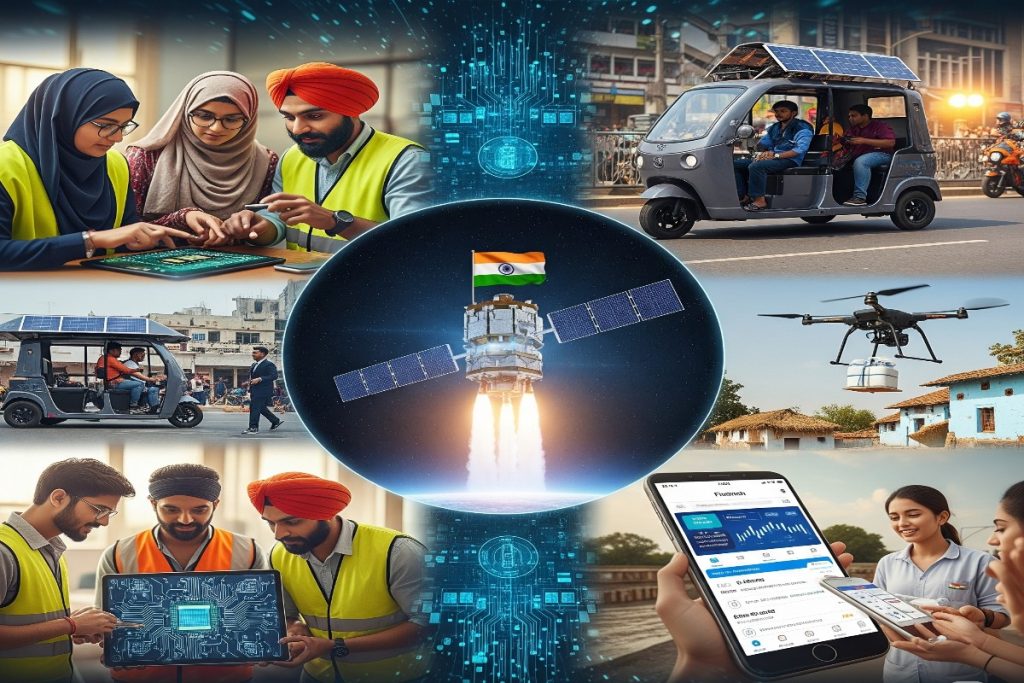Introduction
India has always been known for its IT talent and software exports, but 2025 will be a new era. India is undergoing a silent revolution that is transforming it from a supplier of IT services to a world leader in innovation. Fintech dominance, inexpensive space missions, AI deployments in rural areas, and renewable energy leadership are just a few examples of how Indian tech innovations in 2025 are about effect rather than size.
This blog examines five innovative fields where Indian technology is providing scalable answers to global problems in addition to revolutionizing regional industry.
What Makes Indian Tech Stand Out in 2025?
In 2025, India’s technology ecosystem flourishes through frugal innovation an exceptional capability to develop impactful, cost-effective solutions designed for scalability. The nation’s diversity, limited resources, and mobile-centric populace have fostered the creation of technologies that are practical, inclusive, and profoundly transformative.
What distinguishes India includes:
- Solutions designed for accessibility rather than merely for progress.
- A dynamic startup environment supported by proactive governmental policies.
- Swift integration of AI and blockchain technologies in rural areas, healthcare, and financial sectors.
- A digital-first approach, particularly in Tier 2 and Tier 3 cities.
All these factors position Indian tech innovations in 2025 as a benchmark for emerging economies across the globe.
Affordable Space Tech: Is ISRO Redefining Global Standards?
By accomplishing more with less, India’s space agency, ISRO (Indian Space Research Organization), has garnered international attention. Its Chandrayaan-3 lunar mission in 2023 was less expensive than a Hollywood movie. ISRO is continuing to push the envelope in 2025 with:
- Low-cost satellite launchers for developing countries
- GPS is challenged by indigenous navigation systems (NavIC).
- Partnerships with private space-tech companies such as Agnikul and Skyroot
By democratizing space exploration, these developments allow developing nations to use satellite technology for disaster relief, defense, and agriculture. It should come as no surprise that Indian technological advancements in 2025 are changing the space economy.
UPI & Digital Payments: Can the World Replicate India’s Model?
India’s Unified Payments Interface (UPI) is arguably the most successful real-time payment system globally. By 2025, it is processing over 12 billion transactions each month, and this model is now being adopted by countries such as France, the UAE, and Singapore.
Key factors that contribute to UPI’s prominence include:
- Immediate, cost-free peer-to-peer transactions
- Integration with a multitude of applications, ranging from banking services to ride-sharing platforms
- Interoperability among digital wallets, banking institutions, telecommunications providers, and digital gold platforms
- Government-driven innovation complemented by private sector implementation
UPI represents more than just a triumph in financial technology it serves as a model. Its capacity to promote financial inclusion in both urban and rural regions illustrates how Indian technological advancements in 2025 can establish international standards in digital finance.

AI in Rural Healthcare: Bridging the Accessibility Gap
While a significant portion of the attention surrounding AI is focused on the West, Indian enterprises are discreetly utilizing artificial intelligence to address one of the most urgent issues: access to healthcare in rural areas. By 2025, AI-powered tools are facilitating:
- Diagnosing illnesses through smartphone cameras and voice commands
- Monitoring chronic illnesses from a distance
- Translating medical information into local languages
- Equipping health workers with virtual assistant tools for patient triage
Startups such as Niramai (thermal breast cancer screening) and Remedo (AI consultations with doctors) are gaining momentum throughout Asia and Africa. These models, designed with the limitations of rural areas in mind, demonstrate that Indian technological advancements in 2025 are not only sophisticated but also impactful.
AgriTech Startups: Can India Solve Global Food Challenges?
India stands as an agricultural powerhouse, with its startups transforming traditional practices into solutions that are ready for the future. In 2025, tech innovations in AgriTech encompass:
- AI-driven crop advisory applications available in regional languages
- Satellite-based irrigation notifications
- Drones utilized for precision agriculture
- Supply chain platforms that facilitate direct connections between farmers and buyers.
Companies such as DeHaat, CropIn, and Fasal are not only assisting Indian farmers in enhancing their yields but are also expanding their reach into Southeast Asia and Sub-Saharan Africa. Given the impact of climate change on global food security, the tech innovations emerging from India in 2025 may prove crucial for sustainably feeding the planet.
Sustainable Energy Tech: India’s Role in the Climate Race
India has committed to achieving net-zero emissions by 2070, and significant progress has been made in that direction as of 2025. Indian entrepreneurs and government initiatives are concentrating on solar-powered cold storage devices and AI-optimized energy networks.
- Decentralized renewable energy expansion in remote regions
- Creating industrial green hydrogen technology
- Enhancing systems for recycling lithium-ion batteries
- Using AI to minimize transmission energy loss
With the help of businesses like ReNew Power and government-sponsored programs like the “Green India Mission,” India is emerging as a thought leader in clean energy. Indian technological advancements in 2025 are once again demonstrating that scalability and sustainability can coexist.
Conclusion
India’s evolution from a hub of technology services to a center of innovation is no longer a concept it is currently unfolding. In 2025, Indian technological advancements across sectors such as space, finance, agriculture, health, and climate are not only influencing the lives of 1.4 billion individuals but are also impacting the global landscape.
As an increasing number of professionals and organizations seek to engage with or gain from this surge of innovation, platforms like Wiraa are emerging to facilitate these connections. Wiraa serves as a remote job platform that enables international employers to discover talented Indian professionals who are leading these technological transformations. Whether you are a developer specializing in AI, a product manager creating AgriTech solutions, or a designer developing UPI-based applications, Wiraa assists you in finding your role within this ecosystem.The next significant innovation could very well originate from a small town in India and with the appropriate platform, it has the potential to reach a global audience.




